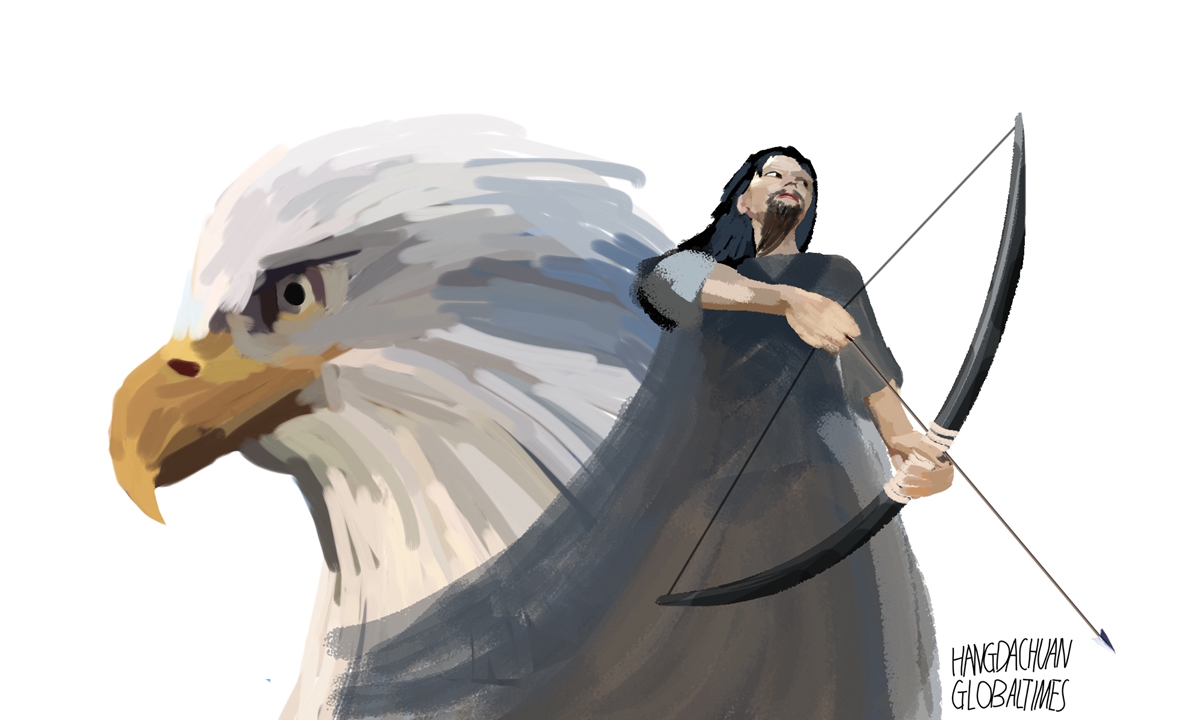
Illustration: Hang Dachuan/Global Times
Hong Kong director Tsui Hark, 72, has announced that the next film he will be working on is a blockbuster period martial arts film entitled
Legends of the Condor Heroes: The Great Hero. The news has ignited hope among Chinese audiences that Tsui, who is famous for his bold cinematography and innovative deconstruction of classic martial arts stories, may be able to revive the genre, which is known as
wuxia in Chinese. A popular genre in literature, TV and film,
wuxia focuses on martial arts and acts of chivalry.
Another exciting factor is that the big-budget epic is an adaptation of the epic novel by famous
wuxia novelist Jin Yong (pen name of Louis Cha)). Chinese idol, actor and singer Xiao Zhan will play the lead character Guo Jing. According to reports, shooting for the film will start in 2023 in Yinchuan, Northwest China's Ningxia Hui Autonomous Region. To coincide with the 100th anniversary of the famed
wuxia author's birth, the film is scheduled for a 2024 release.
Initially serialized in 1957, The Legend of the Condor Heroes is considered Jin Yong's seminal
wuxia novel, marking the start of the Condor trilogy, followed by
The Return of the Condor Heroes and
The Heaven Sword and Dragon Saber. It follows protagonist Guo on his journey to learn his twisted family history and train with mystical kungfu masters. Guo, a man of Han ethnicity who was born in Mongolia, faces a dilemma in taking sides in a looming conflict between the Mongolian and the Southern Song Dynasty (1127-1279) forces.
From 1983 to 2017, the masterpiece has been adapted more than a dozen times across the Chinese-speaking world, including the Chinese mainland and Hong Kong. Every version has been able to attract a huge viewership because each era reflects the styles and filmmaking dynamics of their times. More importantly, the classic itself is unrivaled in terms of popularity and influence.
This time, rather than telling the story of how Guo grows up and learns martial arts, Tsui will focus on a section that has not been described too much in the novel or displayed in TV and film adaptations: How Guo and other martial arts masters defend the city of Xiangyang when the Mongolian army marches southward to destroy the Song Dynasty.
The combination of an intelligent director and a super-famous actor has pushed up the expectation of the Chinese audiences for the epic to the utmost at a time when traditional
wuxia and action movies gradually faded out and are accused of being old-fashioned.
According to Chinese ticketing platform Maoyan, Tsui's two other productions,
Detective Dee: The Four Heavenly Kings (2018) and
The Flying Swords of Dragon Gate (2011), are the two highest-earning
wuxia movies in the mainland.
Tsui has rich experience in making splendid and innovative
wuxia movies with beautiful action choreography, according to industry observers. His representative works such as
New Dragon Gate Inn (1992),
Swordsman (1990) and
Seven Swords (2005) have not only great action, but also a romantic atmosphere. And the Once Upon a Time series (1991-97) interpreted the idea of "the great hero" long ago.
Now Tsui is filming a Jin Yong story once again, and there are reports saying that there will be outstanding martial arts choreographers joining the film, industry observers are confident that the epic will meet the expectations of fans.
Twenty-three years have passed since the success of director Ang Lee's
Crouching Tiger, Hidden Dragon made Chinese kungfu popular all over the world. In recent years, there have been some impressive martial arts films in China, including 2002 film
Hero directed by Zhang Yimou, 2006 film
Fearless directed by Ronny Yu, the
Ip Man series (2008-19) directed by Wilson Yip, and 2014 movie
Brotherhood of Blades directed by Lu Yang.
But
wuxia movies are no longer the mainstream in China. A large part of the younger generation audiences' understanding of the concept of martial arts has been replaced by the fantasy romance genre known as xianxia (immortal heroes). They yearn for love stories of lords instead of great heroes.
Tsui's recreation of
The Legend of the Condor Heroes may become a touchstone for the future development of martial arts films if it can reshape the world's yearning for great heroes, and reproduce the lost righteousness of the martial arts genre among the youths.




